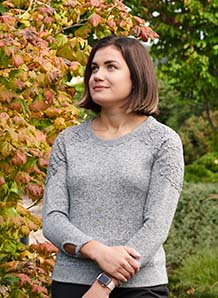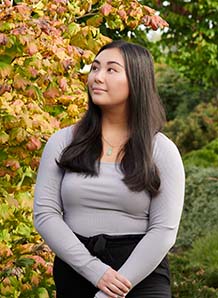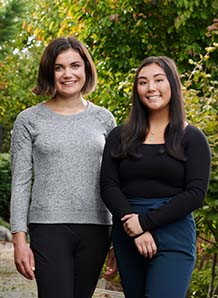MINA SHAHSAVAR AND KATRINA TRAN EYE THE FUTURE WITH A MIX OF OPTIMISM AND CONCERN.
 As young students on the cusp of graduation, they’re excited about the opportunity to practise their chosen craft. They are fully aware of the challenges facing the nursing profession today. But they know that if career problems arise, their union will be there to help them.
As young students on the cusp of graduation, they’re excited about the opportunity to practise their chosen craft. They are fully aware of the challenges facing the nursing profession today. But they know that if career problems arise, their union will be there to help them.
Both are working for BCNU in the union’s professional practice and advocacy and occupational health and safety departments. For many years BCNU has created part-time temporary support positions on staff to give students like Tran and Shahsavar the opportunity to participate in and appreciate the union’s role in nurses’ working lives. The program is just one of the ways BCNU is working to support and involve student nurses as active members of the organization.
Student nurses are the future of health care and the future of BCNU. That’s why the union is committed to helping new nurses build a lasting and resilient nursing community that can effectively support individuals throughout their careers. This begins by helping students prepare for a smooth transition from school to work.
BCNU encourages all students enrolled in nursing programs in the province to become student members of the union. This free membership offers student nurses access to a range of union supports and resources that are designed to better ensure that new nurses are set up for career success.
 Student membership provides access to BCNU workshops and allows students to attend BCNU regional meetings, conferences and educational events focused on issues from human rights and equity to professional practice.
Student membership provides access to BCNU workshops and allows students to attend BCNU regional meetings, conferences and educational events focused on issues from human rights and equity to professional practice.
Tran is a fourth-year Douglas College student graduating this year. She says nursing school is challenging enough without the added uncertainty of a global pandemic and public health restrictions that directly affect students’ ability to learn.
“Honing your actual clinical practice skills and being able to engage with the patient is where most of your learning is going to come from,” she notes. “So, when everything went online and we weren’t doing in-person classes with any labs, or we were at risk of getting kicked out of clinical due to COVID outbreaks, it was really difficult and many of us were really worried about being able to meet those competencies and be ready for practice.”

But she is grateful for the connections she’s been able to maintain with others in her cohort despite the restrictions. “We’re all very supportive of one another. We know we’re not going through this alone and we have other people who can talk to us and share their own challenges – that’s been very reassuring.”
Tran and Shahsavar have also benefited from the Employed Student Nurse Program. First launched 20 years ago following negotiations between BCNU, employers and educators, the program enables third- and fourth-year students to gain clinical experience in health-care facilities in special paid part-time or part-year positions. These positions support a nursing unit’s normal staff complement and students work under the direction of a unit manager.
The experience has helped both students consolidate their skills and given them first-hand insights on their chosen career paths – insight that’s especially valuable given the COVID-19 pandemic and the daunting working conditions health-care workers are facing.
“Nursing is one of those professions that you have to be in for the right reasons, otherwise you’re going to get burnt out really quick and you’ll probably hate going to your job,” says Tran. “And I feel very fortunate that I thoroughly enjoy looking after patients and I think it is such a privilege to be caring for people and their families when they are at their most vulnerable.
“I actually have the word ‘resilient’ tattooed on my forearm as a reminder to myself that life isn’t always going to be perfect.”
When I was younger, I went through a lot and never in a million years would I have thought I’d be where I am today. So that experience keeps me going because COVID and the nursing shortage probably won’t be going away for a long time. But hopefully, there’s a silver lining in all of it.”
Shahsavar is in the third year of her program at the University of the Fraser Valley and plans on graduating next April. Like Tran, she believes a resilient nursing community is one that attracts and supports new members rather than breaking them or pushing them away.
“The nursing profession and society at large needs to do a better job of building people up rather than tearing them down,” she argues. “There’s been so much polarity as a result of COVID and we really need to be more open to others’ perspectives when we tailor our nursing care or when we approach our co-workers or management and come not from a place of judgment but from one of openness and meeting people where they’re at.
“These past 20 months have hit everybody differently so we really need to understand that peoples’ ability to cope may have shifted, and we need to take this into consideration when approaching our work.”
Tran and Shahsavar are both aware of the importance of psychological health and safety and confess that the recent research published by UBC in 2021 has made them especially mindful of the importance of their own mental health. The survey findings provide ample evidence to show how nurses are being impacted by the nursing shortage and suffering from significant burnout, anxiety and depression due to high workloads.
“I have had experience with depression and anxiety since I was 13 years old, so I was already very cognizant of mental health before going into nursing school,” says Tran, who stresses the importance of regular self-care for ensuring psychological safety.
“The plan that’s worked best for me throughout nursing school has been exercise, whether that’s walking my dog, running, lifting weights or any kind of cardio,” she reports. “I walk my dog three to four times a day and during that time I really try to practise mindfulness and just focus on the walk. I also have a gratitude journal and I try to spend a lot of time with people I love.
“And we shouldn’t feel guilty when we are doing anything that’s not nursing related,” she stresses. “In the long run, we can’t take care of other people if we’re not taking care of ourselves.”
Shahsavar agrees. “Everybody who’s been in clinical with me knows that my favourite expression is ‘you can’t pour from an empty cup.’ I say that to all my clinical instructors and at all my group meetings.”
She says self-care must be seen as a necessity. “The stats on nurses’ mental health aren’t just numbers,” she states. “You could very easily become one of those numbers if you don’t do the things you’re taught to mitigate the risk of developing mental health issues, such as carrying trauma and then becoming disengaged and burnt out.”
Already wise beyond their years, Tran and Shahsavar both look forward to being an active part of a resilient nursing community in the years and decades ahead.